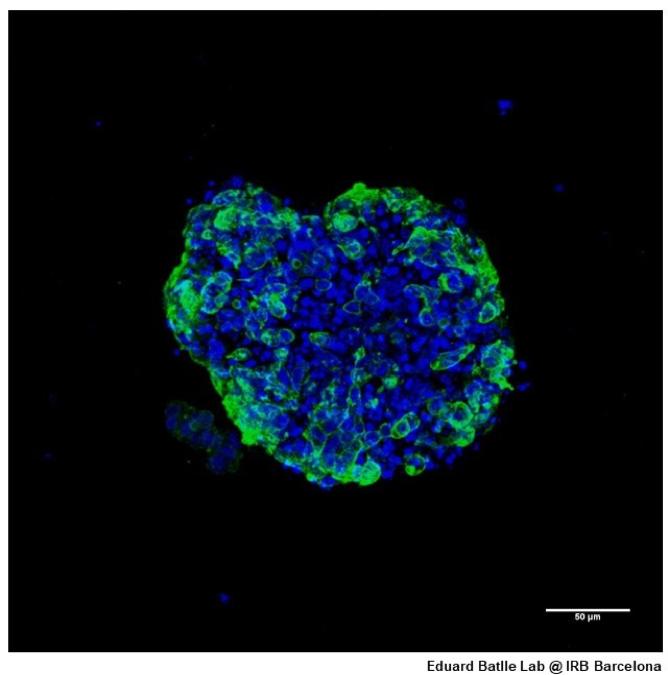
Credit: Eduard Batlle Lab @IRBBarcelona
Frequently, promising cancer therapies fail when applied to patients in the real clinical setting. This occurs despite many of these new treatments demonstrating promising results at the preclinical stage in the lab. One explanation is that many of the tumor models used in early research phases are established cell lines that have been growing for many decades and in two-dimension (2D) culture flasks. These cancer cells might not completely resemble the features of real tumors from patients that expand into three dimensions (3D).
Very recently, it has been possible to grow “organoids” in the laboratories, cancer models respecting their 3D structure. We know very little about these cells, and if they actually mimic the conformation of the tumor within the body, particularly the chemical modifications of DNA that are “beyond genetics,” epigenetics, that don’t change genes but control their expression, such as DNA methylation. An article published in the Journal Epigenetics from Taylor & Francis by the group of Manel Esteller, M.D., Ph.D., Director of the Josep Carreras Leukaemia Research Institute (IJC), ICREA Research Professor and Chairman of Genetics in the University of Barcelona, describes the first comprehensive study of the epigenetic landscape of human tumor organoids, validating the use of these samples for cancer research, that could deliver new oncology treatments.
“Our article solves an unmet biomedical need in the cancer research field: the characterization of the epigenetic fingerprint of human cancer organoids. Our study shows that these tumor models can be very useful for the biomedical research community and the pharmaceutical companies developing anti-cancer drugs”. Says Manel Esteller, and explains: “First, we show that every cancer organoid retains the properties of the tissue of origin: if the samples were obtained from the surgery of a colon or pancreatic cancer, the organoid closely resembles the original primary tumor. Second, there is no contamination of normal cells; thus, the malignant pure transformed cells can be analyzed without interferences. And finally, the 3D organoid cancers are closer to the patient tumors than the commonly used 2D cell lines.”
Two of the most relevant consequences is the open nature of the data obtained with these studies: a large amount of data has been generated to be analyzed with Big Data and made available to the research community. On the other hand, the exchange of samples between researchers is offered to promote more collaborative studies.
“We have deposited all the obtained results in easily accessible public databases, and, in this manner, everyone can perform further data mining to produce new cancer discoveries using different biometric approaches or focusing on particular genes. And most importantly, the characterized cancer organoids can be readily obtainable from a reliable provider (the American Type Culture Collection, ATCC), so researchers around the world can use the epigenetic information of these sharable samples to develop their investigations.” Concludes the researcher.
###
Media Contact
Isabel Troytiño
[email protected]
Related Journal Article
http://dx.




